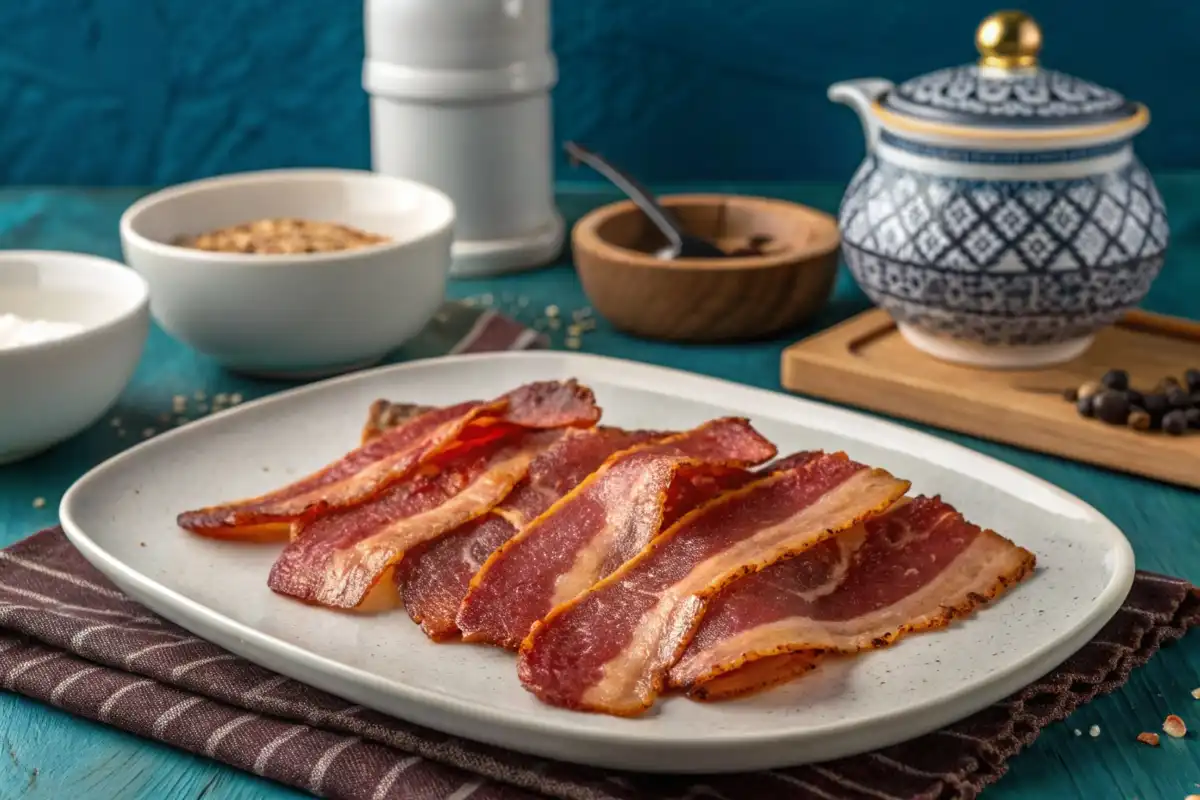The Growing Curiosity
At the present time, many food lovers across the United States explore different culinary options. One question often arises: Can Muslims eat beef bacon? This query reflects a growing interest in understanding how this product fits into dietary guidelines, religious traditions, and personal taste preferences.
In addition, consumers search for alternatives that align with their beliefs. Because the U.S. market now offers a variety of international foods, it becomes essential to understand which items comply with Islamic dietary rules. Therefore, clarifying if beef bacon meets these requirements can help many make more informed decisions. Eventually, people seek not just flavor and texture, but also reassurance that the food respects their values.
In contrast to other meats that might not meet certain criteria, beef bacon might present a viable option. To demonstrate its appeal, we need to look beyond the kitchen and explore religious guidance, sourcing practices, and quality standards. After all, the flavor and crispness only matter if they align with a consumer’s core principles.
Understanding Halal Guidelines Before Asking Can Muslims Eat Beef Bacon?
To properly address Can Muslims eat beef bacon? we must consider the broader context of halal dietary laws. These guidelines, derived from Islamic teachings, define which foods are permissible. Because these rules ensure purity, ethical sourcing, and wholesomeness, they influence the selection of ingredients and preparation methods.
Key Principles of Halal
- Permitted Meats: Halal guidelines allow certain meats, such as beef, provided the animal is slaughtered according to Islamic law.
- Slaughter Method: The animal must be healthy and treated with respect. The process involves a swift, humane cut and the name of God invoked at slaughter.
- Absence of Non-Permissible Additives: Foods must not contain forbidden ingredients. In addition, they must avoid cross-contamination with non-halal products.
Eventually, understanding these core principles sets the stage for determining if beef bacon aligns with Muslim dietary choices. Because it starts with a type of meat that can be halal, there is potential. However, details matter.
From Cattle to Kitchen: How Beef Bacon Is Made
At first glance, beef bacon might sound unusual. Yet, it’s a growing trend in the U.S. culinary scene. Many want to know Can Muslims eat beef bacon? because it resembles a popular breakfast item but uses a different source. However, how is it produced?
The Making Process
- Selecting the Cut: Most producers choose a well-marbled section of beef, often from the navel or belly area. This cut, when cured and cooked, yields a rich, savory flavor.
- Curing and Seasoning: The chosen beef is seasoned with salt and spices. Some producers might add a hint of sweetness or natural flavorings. In addition, curing helps develop that sought-after texture and taste.
- Smoking (Optional): To achieve a smoky depth, some producers smoke the cured beef using wood chips like hickory or applewood. This step enhances aroma and overall appeal.
- Slicing Thin: Finally, the prepared slab is sliced into thin strips. These strips, often fried or baked, develop a crisp exterior and a tender interior.
Because the process resembles the preparation of other cured meats, beef bacon achieves a satisfying crunch and savory profile. However, enjoying it while following Islamic dietary guidelines requires confirmation that every step meets halal standards.
The Halal Certification: Key to Answering Can Muslims Eat Beef Bacon?
When someone asks Can Muslims eat beef bacon? the response often hinges on proper certification. Because halal certification is a recognized standard, products that carry this label assure consumers that the entire process followed Islamic requirements.
Why Halal Certification Matters
- Transparency: Certification signals that an approved body has verified the product.
- Source Verification: It ensures the cattle were slaughtered according to Islamic law.
- Ingredient Check: It confirms no forbidden additives or cross-contamination occurred.
In contrast, products without a halal certification leave room for doubt. Eventually, a Muslim consumer prefers to buy from trusted brands that clearly display halal seals. Therefore, before selecting a package of beef bacon, it helps to look for reputable certifications and check if the brand has a good standing in the halal market.
Can Muslims Eat Beef Bacon? Depends on the Source
Halal rules emphasize both the type of animal and the slaughter method. Since beef bacon comes from cattle, the main question is not about the species but the compliance of preparation. In addition, Muslims must consider whether the curing agents or flavorings used are halal-friendly. For instance, ingredients derived from non-halal sources would render the final product impermissible.
Tips for Choosing Halal Beef Bacon
- Check for Halal Seal: Look for official certification from bodies like IFANCA or other well-known organizations.
- Read the Ingredient List: Ensure that seasonings, preservatives, and additives comply with halal standards.
- Contact the Manufacturer: Some consumers directly reach out to companies. They ask detailed questions to confirm the halal status of their products.
By taking these steps, one can feel more confident in answering the big question: Can Muslims eat beef bacon? The key lies in ensuring every link in the production chain respects Islamic guidelines.
Nutritional Insights: Adding Context to Can Muslims Eat Beef Bacon?
Beyond religious considerations, many wonder about the nutritional profile of beef bacon. After all, even if something is halal, is it good for you? While this depends on portion sizes and overall diet, it’s helpful to understand basic nutrient data.
Below is a sample nutritional table for two thin slices (about 28 g) of beef bacon:
| Nutrient | Per 2 Slices (28 g) |
|---|---|
| Calories | ~90 kcal |
| Protein | ~6 g |
| Total Fat | ~6 g |
| Saturated Fat | ~2.5 g |
| Carbohydrates | ~1 g |
| Sodium | ~190 mg |
| Iron | ~2% DV |
| Zinc | ~4% DV |
(Note: Values vary by brand and preparation method.)
In addition, like many cured meats, beef bacon often contains salt. Therefore, moderate consumption and pairing it with nutritious foods can support a balanced meal. Because Muslims, like many health-conscious consumers, value wholesome eating, considering the nutritional aspect helps paint a complete picture.
How to Enjoy It: Culinary Ideas That Answer Can Muslims Eat Beef Bacon?
If the product is halal certified and you feel confident in its source, how can you enjoy beef bacon in a meal? Think of it as a versatile ingredient that adds a savory crunch to various dishes. Because it has a rich, meaty flavor, it complements many cuisines.

Breakfast Delights
- Crisp Strips and Eggs: Serve a few strips alongside scrambled eggs and whole-grain toast.
- Wraps and Rolls: Roll thin strips into whole-wheat wraps with spinach and tomatoes for a quick, protein-packed start.
- Hearty Hash: Chop it into bits and toss with diced potatoes, onions, and bell peppers.
Lunch and Dinner Twists
- Salad Topping: Crumble some over a mixed green salad with cucumbers, cherry tomatoes, and a light dressing.
- Soup Garnish: Sprinkle crisp bits on creamy vegetable soups for a smoky depth.
- Grain Bowl Companion: Add it to quinoa or brown rice bowls loaded with roasted veggies.
Because it pairs well with various flavors, you can integrate beef bacon into many meals. In addition, balancing it with fresh produce and whole grains ensures a nutritious approach.

A Lighthearted Moment: Humor in the Middle
A Quick Joke:
Why did the thin beef strip join a stand-up comedy show?
Because it wanted to “crack up” the crowd with its crispy humor!
(Yes, it’s a groaner, but a little laughter can make cooking and dining even more enjoyable.)
The Cultural Context: Why Can Muslims Eat Beef Bacon? Matters
At the present time, the U.S. culinary landscape is more diverse than ever. Many restaurants and stores cater to various dietary needs. Therefore, understanding whether Can Muslims eat beef bacon? helps chefs, home cooks, and food brands serve their customers better.
Meeting Consumer Demand
- Halal-Certified Menus: Restaurants offering halal items can attract a broader clientele. Serving beef bacon that meets halal standards can make customers feel included.
- Grocery Store Shelves: Halal-certified beef bacon products give shoppers a clear, convenient choice. This transparency builds trust and loyalty.
- Cultural Exchange: Introducing halal-friendly options encourages cultural understanding and respect. Food often serves as a bridge between communities.
By acknowledging these factors, food producers and retailers can help answer Can Muslims eat beef bacon? by providing quality products that respect religious norms.
Checking Labels and Claims
Before putting any product in your cart, reading labels is essential. Because marketing terms can confuse, look for clear indicators like a halal certification symbol. In addition, check ingredient lists for any questionable items. For example, ensure that no animal-based additives come from sources that are not permissible.
Common Halal-Friendly Ingredients
- Salt and Natural Spices: Pure seasonings without harmful additives pose no problem.
- Natural Smoke Flavors: Derived from burning wood chips, these flavors usually align with halal requirements.
- Vinegar or Fruit Extracts: Commonly used for flavor, these are generally acceptable if they don’t come from forbidden sources.
By confirming these points, you can comfortably say yes when someone asks Can Muslims eat beef bacon? You know you’ve done your due diligence.

Preparing Beef Bacon at Home: Another Angle
Some consumers prefer homemade options. While not everyone can easily produce beef bacon from scratch, knowing the basics helps. If you control the process, you ensure every step aligns with halal principles. Therefore, if you have access to halal butchers, you could attempt a small-scale version at home.
Basic Steps for Homemade Adventures
- Start with Halal-Certified Beef: Choose a fresh cut that suits the style of beef bacon.
- Create a Halal-Friendly Cure: Use salt, sugar, and spices verified as halal. Avoid any questionable additives.
- Cure and Possibly Smoke the Meat: Follow a proven recipe, adjusting flavors to personal taste.
- Slice Thin and Cook Gently: Fry or bake until crispy. Enjoy the result with the confidence that you managed every detail.
Because this approach requires time and effort, it may not suit everyone. However, it offers a unique culinary project for those who enjoy experimenting.
Religious Consultation and Community Input
Sometimes, simply reading labels or checking certification might not be enough. Because religious interpretations can vary, some individuals seek advice from trusted religious scholars. Consulting knowledgeable individuals can provide clarity.
Engaging the Community
- Ask Local Religious Leaders: They often understand halal food rules well.
- Online Forums and Groups: Many Muslim communities share product recommendations and tips.
- Check Halal Food Guides: Websites and apps list certified brands and restaurants.
By tapping into community resources, you gain firsthand insights. Therefore, if a friend asks Can Muslims eat beef bacon? you can offer informed advice backed by expert opinions.
Addressing the Complexity of Can Muslims Eat Beef Bacon?
It’s important to remember that not all beef bacon products are the same. Different brands use different methods, ingredients, and sourcing. As a result, the answer to Can Muslims eat beef bacon? might vary depending on which brand we’re talking about.
Factors That Influence Halal Status
- Slaughter Practices: Was the animal slaughtered under halal conditions?
- Curing Agents: Are all additives, spices, and preservatives halal-approved?
- Handling and Packaging: Was the product kept separate from non-halal items?
In addition, while the term beef bacon suggests a beef-only product, always confirm no non-halal additives slipped into the process.
Frequently Asked Questions About Can Muslims Eat Beef Bacon?
Q: Is all beef naturally halal?
A: Beef can be halal if slaughtered according to Islamic law. In addition, it must come from a permissible source and handled correctly.
Q: Does beef bacon taste different from other strips?
A: Yes. It offers a meaty flavor and a satisfying texture. However, its taste may vary by brand and curing method.
Q: Can Muslims rely on just a label that says ‘beef bacon’?
A: Not always. Because the label “beef bacon” does not guarantee halal status, look for certification and reliable sources.
Q: What is beef bacon made of?
Beef bacon is made from beef, specifically the belly or brisket cuts of the cow. These cuts are cured, smoked, and sliced in a manner similar to traditional pork bacon, offering a similar taste and texture with a beefy twist…
Q: Is beef bacon healthier?
🥩Beef bacon is often considered a healthier alternative to pork bacon because it generally contains less fat and fewer calories, depending on the cut. However, it is still a processed meat and can be high in sodium, so moderation is key for a balanced diet…
Q: Which is better, turkey bacon or beef bacon?
The choice between turkey bacon and 🥩beef bacon depends on personal preference and dietary…
Q: Are there low-sodium or reduced-fat versions of beef bacon?
A: Some brands offer variations. Check nutritional labels and choose the product that aligns with your dietary goals.
Q: How can I confirm if a restaurant’s beef bacon is halal?
A: Ask staff about their sourcing and certification. Reputable halal restaurants proudly display their credentials.
Conclusion: Can Muslims Eat Beef Bacon? The Final Word
Can Muslims eat beef bacon? The answer hinges on careful selection, proper certification, and trusted sourcing. In conclusion, if the beef originates from halal-certified farms, if the curing process avoids forbidden ingredients, and if the entire supply chain respects Islamic guidelines, then yes, Muslims can enjoy it.
At the present time, the U.S. market offers more halal-certified foods than ever. Therefore, consumers can find beef bacon that fits their values without sacrificing taste. In addition, by reading labels, seeking reliable information, and opting for trusted brands, you can include this savory option in your meals with confidence.
To sum up, can Muslims eat beef bacon? Absolutely, as long as the product is genuinely halal. With the right knowledge and a bit of research, you can savor this flavorful treat while respecting your faith and principles.
